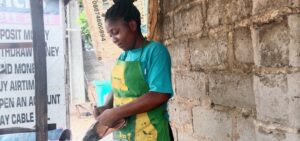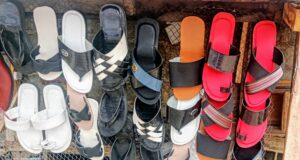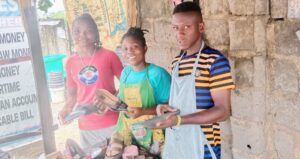

By Dada Ahmed.


Designers’shoes produced by Esther.

A quiet but powerful revolution is unfolding in the bustling city of Lokoja, north central Nigeria,right at the ever-busy Zone 8 roundabout. It is not driven by protests or fiery political rhetoric but by the determined hands and resilient spirit of a young woman named Miss Esther John,a shoemaker by profession.
Esther is rewriting the narrative of what women can achieve in male-dominated professions. Her journey into shoemaking, a field rarely ventured into by women in Northern Nigeria, is fueled by passion, perseverance, and a strong sense of purpose.
Hailing from Okengwe in Okene Local Government Area of Kogi State, Esther made a bold decision in 2017 to learn shoemaking. “I chose to become a shoemaker purely out of passion,” she told this correspondent in an interview.“That year, I enrolled in one of the reputable shoemaking workshops in Lokoja to acquire the skills professionally.”
By 2019, she had completed her apprenticeship and set up her own outfit with two apprentices under her mentorship. On a good day, she earns between N4,000 and N5,000, which she uses to take care of her younger siblings and aging parents. “Shoemaking puts food on my table. It sustains me financially and gives me the pride of contributing meaningfully to my family,” she said.
But Esther does more than repair worn-out shoes. She designs and produces custom footwear that competes favorably with popular brands from Aba and other shoemaking hubs around the world. “My designs reflect creativity, durability, and comfort. I want people to wear my shoes with pride,” she explained with confidence.
Esther passionately appeals to the Kogi State Government, led by Governor Ahmed Usman Ododo, to support women in vocational trades through soft loans and business-friendly policies. “With the right support, I can acquire modern equipment, expand my workshop, and train even more people, especially women,” she said. She also expressed optimism that the First Lady of Kogi State could extend support through her empowerment programmes, which would boost her morale and productivity.
Despite operating in a field dominated by men, Esther insists she has not experienced any form of harassment. “The men in the industry see me as a fellow professional and partner in progress. There’s nothing to fear about being in a male-dominated profession. We need to stop discouraging women from choosing such paths,”she said.
She encourages young women not to be deterred by stereotypes. “Shoemaking is not just a man’s job. It is a viable profession. If you are serious and passionate, you can succeed,” according to her.
Esther’s story has captured the admiration of many in Lokoja. Customers, passers-by, and other residents commend her courage, describing her as a living example of modern-day feminism,not loud or confrontational, but practical and empowering. Her presence at a strategic location like Zone 8 speaks volumes about her determination to thrive and inspire.
Her journey, which started as a passion has grown into a mission. “I didn’t choose shoemaking because it was easy,” she said. “I chose it because I wanted to be self-reliant and contribute to the development of Kogi State.”
Esther’s outlook aligns with a new wave of feminism that is rooted in local realities and practical solutions,far from the misconceptions of it being a foreign or elitist ideology. In her view, feminism is about creating space for women to pursue their dreams and thrive in any field they choose.
To truly leverage the transformative potential of women like Esther, the Kogi State Government, through initiatives like the SME Development Programme, can increase support for more female entrepreneurs. Such initiatives can enhance inclusion, promote local innovation, and uplift communities.Same goes for NGOs which focus attention on gender agenda and human development to assist her achieve much desire success in her chosen profession.
Vocational training centres across the state can also incorporate mentorship programmes, using Esther as a model to encourage more women to venture into technical crafts and trades. Featuring her story in these programmes would not only inspire confidence but also demystify the idea that some professions are “not for women.”
Economic analysts believe that Esther’s contributions,though humble,can boost the local economy and serve as a catalyst for broader gender inclusivity in entrepreneurship.
Esther’s story is not just about making shoes—it’s about making a statement. A statement that says gender should never define a person’s potential. Her workshop at Zone 8 is more than a place of business; it is a symbol of quiet resistance, empowerment, and hope.
As Kogi State charts its path toward inclusive growth, it is imperative that efforts be made to support young, passionate citizens like Esther. With access to resources, mentorship, and funding, more women can be empowered to chart similar paths and become agents of social and economic transformation.
With the right support, Esther’s dream,and that of countless others can become a beacon of hope for the next generation of women redefining success in their own terms.
Ahmed publishes The Reporters.

